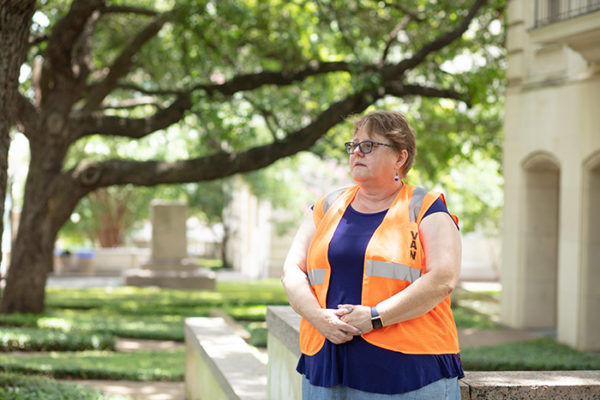“Longhorns take care of each other” isn’t just a safety slogan used around campus — it’s the sentiment that inspired the creation of the UTPD Victims Advocate Network.
“There was a longtime employee of the university, a woman who was on her way to a staff meeting … and she had a heart attack,” says Deborah Sharp, a senior social worker with the UT HealthPoint Employee Assistance Program. “Her co-workers tried to revive her, unsuccessfully. The police responded, and obviously there were a number of distraught people.”
Sharp says The University of Texas Police Department reached out to the Employee Assistance Program — an office within Human Resources that provides counseling to current and former university employees and their dependents — to send counselors to the scene to aid the distressed witnesses. But EAP didn’t have the resources to respond to an emergency request while also managing their full schedule of counseling appointments, Sharp says, and this type of crisis response requires specific training.
Seeing a need to offer immediate assistance and support to the victims and witnesses of crimes or other traumatic events, Sharp says she and UTPD Capt. Chris Bonnet wanted to work to fill the gaps between the duties of EAP and UTPD. Nearly five years later, the volunteer program known as VAN had its inaugural semester during spring 2019.
Fifteen staff and faculty volunteers had gone through the training and vetting process by the beginning of August, with six more in the pipeline, program coordinator Marica Wright says.
Sharp says the training teaches potential volunteers about whom and what they might encounter during a call. Part of that focuses on mental health first aid — different from traditional first aid, in which visible wounds are treated, because it addresses issues that victims and witnesses of trauma often experience.
“You want somebody to be there and be kind to you and explain what’s going on maybe 500 times because you have this white noise thing going on in your brain, and you can’t take in any information,” Sharp says. “Many people respond even in Texas summers with chills when they’ve had a traumatic event, so our advocates carry blankets.”
Sharp says there are a number of other physiological responses to trauma that VAN volunteers are trained to cope with. They carry certain items with them and offer a safe presence to counter these symptoms and help victims in their moment of need.
“We have a stress ball because sometimes it’s good to have something to hang on to,” Sharp says. “To get, I don’t know, a bottle of water, a cup of coffee … just to have someone there to be kind to you.”
Trainees also ride along with both UTPD and the Austin Police Department’s victim services volunteer program to watch and learn from professionals. During their ride-out with APD’s own volunteers, Wright says VAN volunteers can encounter situations similar to what they will respond to on campus in a controlled way with an experienced guide.
After potential volunteers have completed the vetting process, including a background check, and initial training, they are expected to set aside 16 hours a month to be on call. Those who would like to do some on-call shifts during work hours must seek supervisor approval. Up to four hours a month can be counted as work hours, if approved, and the volunteer schedule is flexible, Wright says.
“If you’ve got a spare four hours a week, whether it’s two hours at a time, we can work with you,” Wright says.
Wright says VAN served staff and faculty members during its first semester but will expand to offer services to students as well as faculty and staff members and visitors to the university.
UTPD Sgt. Samantha Stanford says VAN volunteers, as on-the-ground responders who can provide mental health first aid, provide a service that isn’t always covered by other departments on campus.
“Whenever we have a critical incident or someone who’s been affected by something that might seem minor but is having a big effect on (victims) in their lives, they can show up and provide resources,” Stanford says.
Human Resource Coordinator Andrea Zabcik has gone far beyond the minimum volunteer requirement: She has set aside four hours a day, three times a week — 48 hours a month — to be on call.
“I have a friend, a very good friend who has been a victim advocate in Taylor, where I live,” Zabcik says. “Obviously she can’t talk in detail about what’s going on. But just knowing that you can give someone existential help with just a little bit of your time is amazing.”
Zabcik says people considering becoming VAN volunteers should think about whether they can remove themselves emotionally from a difficult situation.
“You have to be prepared to potentially see some pretty awful things,” Zabcik says. “You have to be able to separate yourself from being a volunteer. You cannot get personally involved with the victims because that would be too great of a burden on yourself. You’re there to just guide them.”
Wright says the response to calls for volunteers has affected her greatly.
“I was pleasantly surprised and humbled by the selfless way so many people have stepped up,” Wright says. “It’s like we say on campus: ‘Longhorns take care of each other.’”



